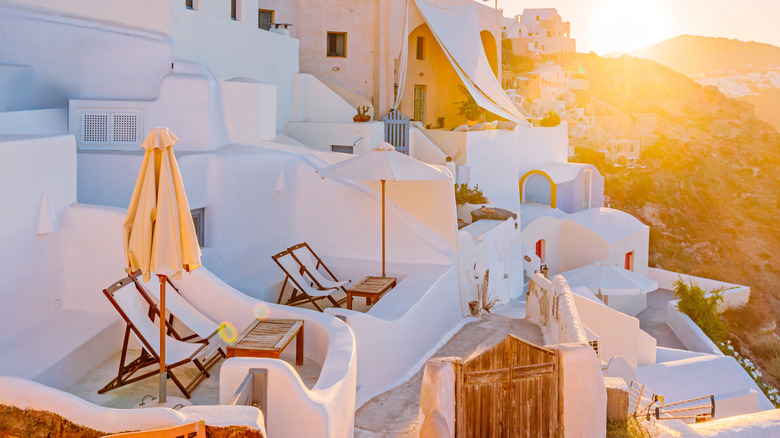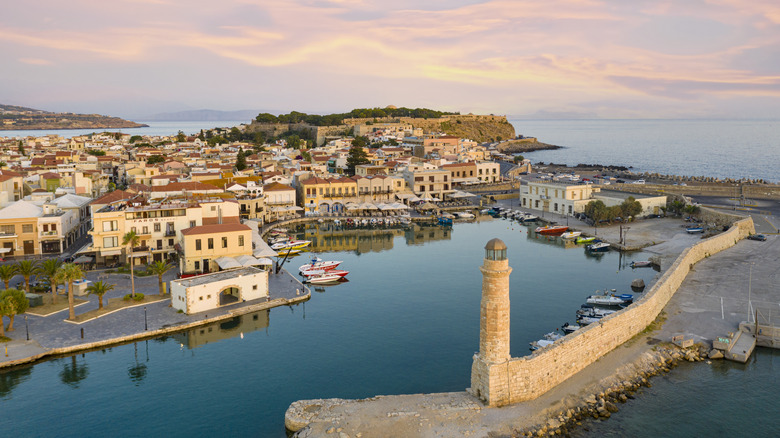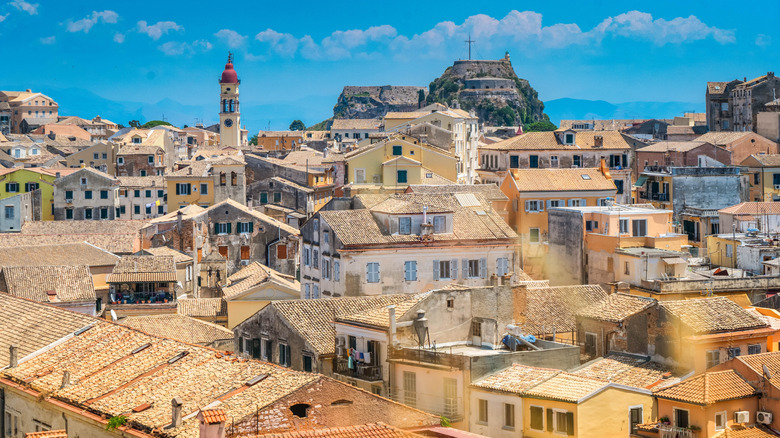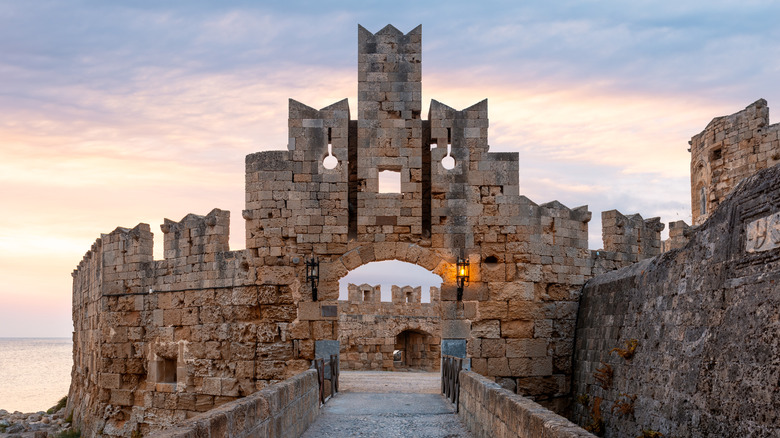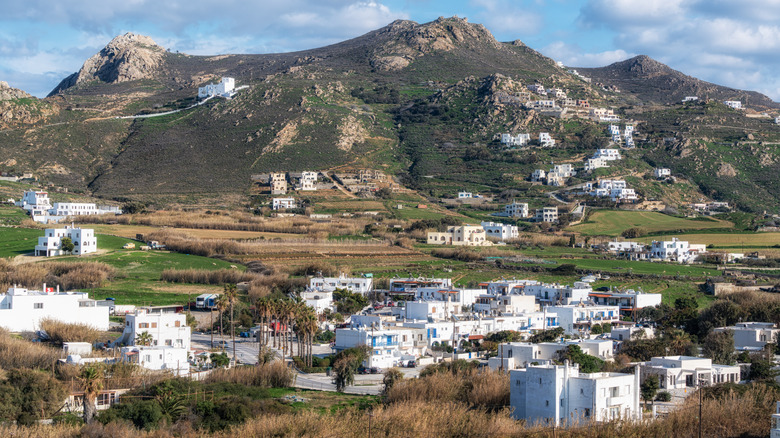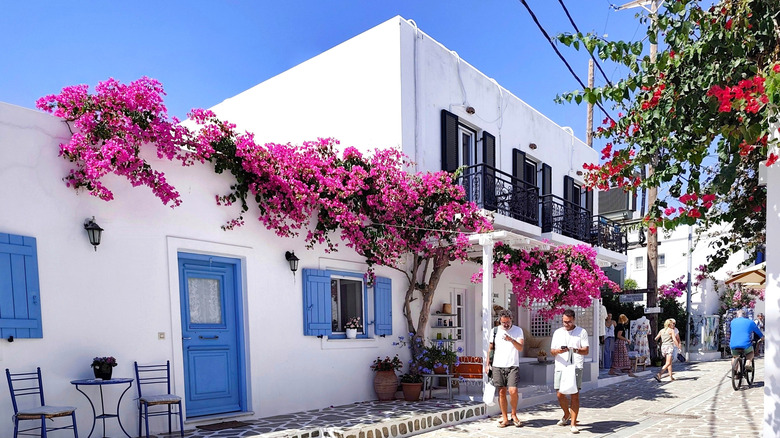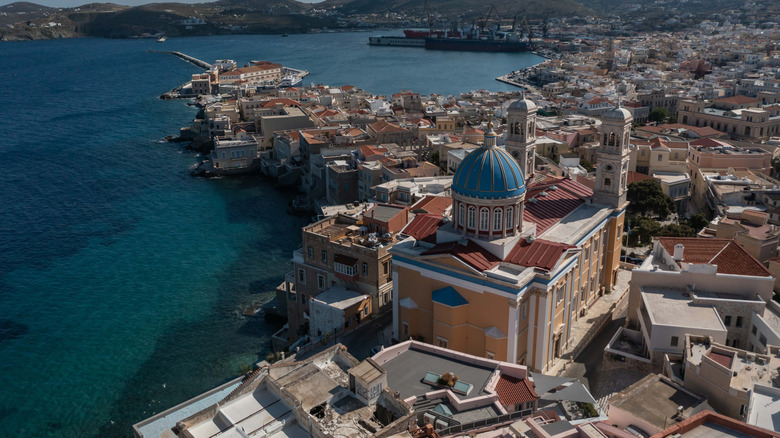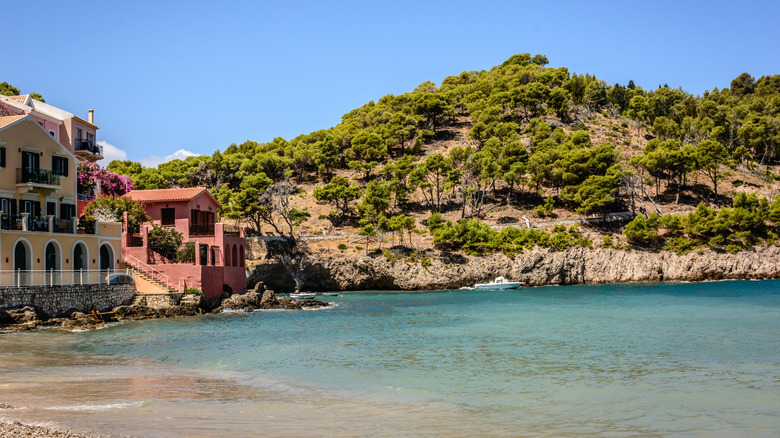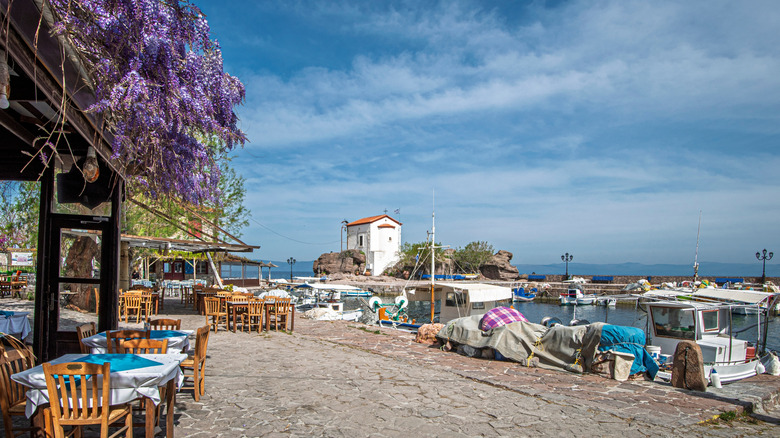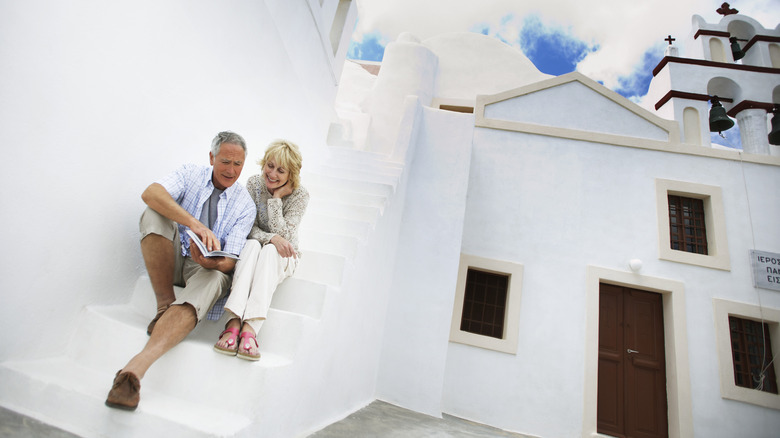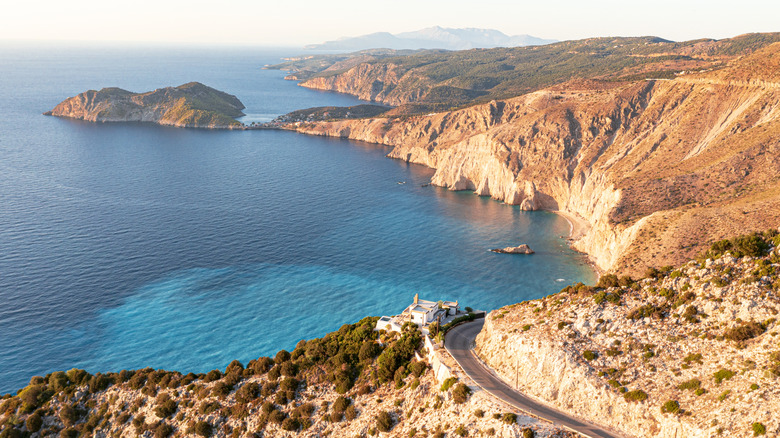The Best Greek Islands To Retire To In 2025 For Sunshine, Charm, And Community, According To Expats
For retirees focused on their next chapter, Greece is one of the most attractive relocation destinations in Europe. The nation's Golden Visa program allows retirees with plenty in the bank to gain residency by investing in property. Americans will need to apply for a visa if they intend to reside in Greece for longer than 90 days in a 180-day period, but it is well worth the trouble. Pair all of this with a comparatively low cost of living — on average, expenses are 23% cheaper than in the United States and 45% less costly than in the United Kingdom— and it's easy to see why expats are choosing Greek islands to savor their golden years.
However, affordability and ease of immigration only tell part of the story. Greece typically has over 250 sunny days per year, which is perfect for retirees looking to stay active outdoors. Healthcare is another major draw for seniors with one eye on quality of life. The Greek National Health System (ESY) provides affordable (often free) public coverage, while private healthcare is popular with retirees because it generally offers shorter wait times and a higher likelihood of working with English-speaking doctors.
For this guide, we've chosen the best Greek islands for retirement based on the factors that tend to matter most to retirees. These criteria include sunshine hours, reliable access to healthcare either on the island proper or via connections to mainland facilities, and a manageable cost of living. We also took into account the availability of expat and retiree communities, as a sense of belonging is an important part of adjusting to any new place you may call home throughout your life.
Crete
Often regarded as the quintessential Greek getaway, Crete leads our list of retirement-friendly Greek islands. Believe it or not, it isn't just about the weather, though its (nearly) 300 sunny days a year certainly help. What sets Crete apart are the practical advantages in areas that generally matter most for retirees. The cost of living is manageable on most budgets, with total monthly expenses averaging between €1,200 and €2,000.
Healthcare is another key factor for older expats. In this area, Crete benefits from being Greece's most populous island, with a population of 630,000 residents. This means that there are numerous public and private healthcare facilities, particularly in larger cities such as Heraklion and Chania, that are highly rated and easily accessible. The last thing a retiree needs is to be stuck in paradise without help in a health crisis. Transit is another area where Crete thrives, with two international airports, making it easy for retirees to visit their home countries. There is also a reliable bus system connecting smaller villages to major hubs.
Western retirees also find Crete appealing because of its established expat communities, where social clubs and English-speaking members make integration easier. With affordable housing, easy access to healthcare, and friendly locals plus thriving retiree networks, Crete is a fabulous mix of natural beauty and practicality. And don't just take our word for it; Crete was even voted the best Greek island for retirement in 2025.
Corfu
A pristine paradise with a rich heritage, Corfu has the largest expatriate community in Greece (according to Expatra), and is a particular favorite among Northern Europeans thanks to a lingering British influence that makes daily life easier for English speakers. Many of the expats living on this island are retirees, which means that social networks for seniors are relatively easy to find. Healthcare is another strong draw here, with Corfu General Hospital in Corfu Town (also known as Kerkyra) and multiple private clinics with English-speaking staff catering to expats.
Corfu was under Venetian rule for hundreds of years, and offers a distinctly Italian architectural feel in comparison to other Greek Isles. This attracts culturally literate retirees who are passionate about history, or folks who simply want to spend their golden years surrounded by sumptuous architecture. The New Venetian Fortress and the Old Town in Kerkyra (a UNESCO World Heritage site) are both great places for retirees to soak up centuries of historical charm.
For those seeking a quieter life, inland towns like Pelekas or coastal areas outside of the main tourist zones offer peaceful, laid-back lifestyles. Outdoor activities such as snorkeling, golf, and hiking abound throughout Corfu, making it easy for retirees to stay active with low-impact pursuits. With an international airport, accessible healthcare, and built-in expat support, Corfu is one of the easiest Greek islands for retirees to transition into island life without straying too far from their comfort zone. Sometimes, an easy life is the best life.
Rhodes
Rhodes combines a rich history with a lifestyle that works well for retirees seeking substance to enrich their days in the sun. Famous for its Medieval City (another UNESCO World Heritage Site), the island offers a stunning backdrop for a broad range of activities, whether retired expats choose to stroll ancient walls with their grandkids, explore the Lindos Acropolis, or enjoy year-round local festivals. Beyond its history and local culture, the real appeal of Rhodes lies in how livable it is for people looking to relax after years of hard work. Like many other Greek islands, Rhodes enjoys more than 300 days of sunshine a year, and, despite being one of Greece's most popular islands, retirees can still enjoy a slower pace of life in villages like Afantou or Archangelos. Housing prices on Rhodes are also lower than the cost of buying a home on other popular islands like Mykonos and Santorini.
Healthcare access is readily available, with Rhodes General Hospital located in the island's largest city (also called Rhodes) and private clinics throughout the island. For retirees who plan on making regular trips home or hosting guests, Rhodes International Airport (also known as Diagoras International Airport) offers direct flights to destinations worldwide. Retiring in Rhodes means waking up to history while enjoying modern conveniences on a daily basis. Affordable housing, easy access to healthcare, and readily available cultural activities make Rhodes the perfect place for retirees who want to experience ancient Greece without sacrificing creature comforts.
Naxos
Despite its close proximity to world-famous islands like Santorini and Mykonos, Naxos has somehow managed to remain under the radar of most tourists. It is actually larger than its Cycladic neighbors, and offers stunning sea views without the crowds. Naxos is an agricultural center steeped in Greek farming culture, and is known for welcoming locals who embrace retirees, but there are also financial reasons to head here later in life. Compared to both Santorini and Mykonos, homes on Naxos are much more budget-friendly; retirees can expect to pay under €100,000 ($115,000) for renovation-ready residences in inland villages, €200,000 ($230,000) to €400,000 ($460,000) for two- or three-bedroom turnkey apartments and townhouses near the coast, or upwards of €600,000 ($700,000) for luxury villas.
Healthcare access is reliable for senior citizens on Naxos. The island is home to a well-equipped general hospital that can handle most everyday healthcare needs, as well as pharmacies in various villages. The rural pace of the island is perfect for retirees who are looking to spend their days soaking up authentic Greek culture, and from exploring olive groves to eating at local restaurants or picking up the island's famous cheeses at the local market, you'll find yourself integrating into daily island life. Although there is no international airport on Naxos, retirees can easily access the mainland via regional flights or ferries. Thanks to its affordability, beautiful scenery, and authentic cultural immersion, Naxos is a peaceful place for retirees to call home. It is also home to one of the most family-friendly beaches in Europe.
Paros and Antiparos
Paros and its beachy secret sister island, Antiparos, offer a generally quiet Greek retirement lifestyle with just a dash of celebrity glamour — Tom Hanks and Pierce Brosnan are among the A-listers who own villas on secluded Antiparos. Paros, something of a Santorini lookalike without the crowds, is peaceful without sacrificing fun. Expat Exchange notes that the island has a vibrant nightlife (for those interested in taking part), welcoming locals, and plenty of opportunities for retirees to make new friends. Public healthcare is available through the Paros Health Center in the island's capital, Parikia, while private clinics can be found throughout both Paros and Antiparos.
Retirees who don't want to be far from necessities tend to settle in Parikia, where infrastructure like shops, pharmacies, and access to buses and ferries are readily available. Those looking for a serene Cycladic lifestyle may want to consider the historic village of Lefkes or Piso Livadi. Lefkes has a particularly fascinating history: It became the medieval capital of Paros because it was far enough inland to be shielded from pirates who might be looking to pillage and plunder. Today, English is widely spoken, and the islands are home to several retirement communities that provide built-in social activities. For retirees seeking a combination of relaxed, beachy charm and authentic Greek villages, Paros and Antiparos could be the perfect fit.
Syros
A hidden gem with colorful buildings and quiet streets, Syros stands out in the Cyclades because the permanent population is large enough to sustain businesses year-round, not just during tourist season. This makes it a particularly attractive option for retirees who want to enjoy cultural engagement and dependable amenities in every season. The capital, Ermoupoli, serves as a bustling administrative and cultural hub, and it is home to the beautiful Apollon Theater, art galleries, various cafés, and festivals throughout the year. Regarding retiree healthcare, the General Hospital of Syros has a 150‑bed capacity and is capable of handling most medical specialties. Living costs are reasonable, with one expat reporting on International Living that roughly €1,400 per month can cover housing, groceries, and health insurance, leaving disposable income for traveling to other European nations.
As Syros has a year-round population of over 20,000, the strong local community offers a variety of activities for retirees to consider. There are groups like the Syros International Sea Swimmers, which has over 70 members from about 20 nations. Syros is "full to the brim with expats," gushed a 2024 post in the Expats in Greece Facebook group. The island is home to a regional airport, with easy access to Athens International for flights home (or for picking up guests). With its year-round activity options and existing expat population, Syros offers retirees a rich combination of culture, convenience, and community.
Kefalonia
The largest of the Ionian Islands, Kefalonia should be a frontrunner for retirees who value tranquility above all else. In contrast to busier retirement havens like Crete or Rhodes, Kefalonia is renowned for its peaceful, non-touristy rhythm, with secluded beaches, lush green landscapes, and welcoming local residents. Expat homes on Kefalonia often feature a blend of traditional Greek architecture and modern conveniences, according to Expat Exchange. The cost of buying a home can vary greatly, from a few hundred thousand euros for a city-center apartment to several million euros for a seafront villa.
Healthcare on Kefalonia is provided through 12 regional clinics, while more advanced care can be accessed at the General Hospital in the island's capital, Argostoli. Retirees who enjoy outdoor activity will find plenty to do on this island. It is home to Melissani Cave, hiking trails through Mount Ainos National Park, and sea kayaking excursions. The former offers a particularly incredible experience, with dreamlike boat tours available on the mystical lake surrounding the cave. For those who want retirement to feel like a permanent vacation, underrated Kefalonia and its ample wine tastings might be the way to go.
Lesvos
Lesvos (often spelled Lesbos), Greece's under-the-radar, third-largest island, offers retirees an appealing mixture of affordability and authentic village life. Unlike more commercialized islands such as Santorini or Rhodes, Lesvos still offers a traditional feel, marked by olive groves, fishing bays, and a slow pace to daily life. For retirees seeking to stretch their budgets, Lesvos offers affordable housing options. In fact, if you're willing to do a total renovation as a retirement project, you may even be able to snag a home for about €15,000 ($17,000). If you want to spend your golden years in luxury, sumptuous Neo-classical mansions are typically priced upwards of €500,000 ($580,000).
Mytilene, with a population of around 30,000, is home to retiree necessities like shops, restaurants, and ferry access to Athens. Expats already living on Lesvos (commenting on Tripadvisor) note that it does lack some of the extensive international infrastructure seen on larger islands, which can mean fewer English-speaking professionals or limited access to advanced medical care. For retirees in good health who prioritize budget and a truly authentic Greek experience, Lesvos delivers, but living there may require more independence than the nation's more mainstream islands.
The role of community
When choosing a Greek island for retirement, the strength of its expatriate community should be one of your top priorities. Even the most beautiful location can feel isolating without meaningful connections, which is why retirees moving to Greece often gravitate toward islands with established expat communities. Groups like InterNations Greece offer organized events and resources for new arrivals from various countries, while platforms like Meetup host Greek expat language exchanges and cultural activities. Networks like these can help retirees ease into daily life by providing social interaction, practical advice, and chances to practice speaking Greek.
For those fortunate enough to already have friends or family living on one of the many magnificent Greek islands, proximity to loved ones can a deciding factor in picking where to retire. Retirees benefit from instant companionship and guidance on navigating healthcare, government regulations, and local customs. Finding a sense of belonging – whether immediate with friends and family or found through expat clubs – can also make practical, everyday challenges less daunting. Whether it's learning which markets have the freshest produce or simply having a neighbor to chat with over a cup of coffee, having loved ones in your corner can lead to a richer, more fulfilling life abroad. Ultimately, community is what transforms a retirement destination from a long vacation into a viable, long-term lifestyle choice.
Visas and practical considerations
For retirees who dream of Greek island life, understanding the logistics is a critical step to making the daydream a reality. Greece's Golden Visa program grants five-year residence permits to non-European Union retirees who invest €250,000 or more in real estate, and there are various thresholds depending on where you wish to move. This is one of Europe's most affordable Golden Visa options, and a major draw for foreign retirees. Even if this program is out of reach, many retirees can still apply for a long-stay "Financially Independent Person (FIP)" visa if they guarantee sufficient income and healthcare coverage.
Regarding buying property in Greece, you'll pay a one-time real estate transfer tax of approximately 3% upon purchase. Once the property is in your name, annual costs include ENFIA, a property ownership tax calculated based on factors like location, size, and age, and a supplementary levy on properties exceeding specific preset values. Additional taxes — such as capital gains, income from rentals, and inheritance — may apply in certain cases, but Greece's digital tax system simplifies compliance for both lifelong residents and expatriates.
Methodology
In compiling this guide, we focused on the factors that often matter most to retirees, including access to healthcare, the existing presence of expats, and affordability. Much of the data came from accounts written by expatriates, government websites, and trustworthy sources that cater to retiree expats. While no two retirees will have exactly the same priorities, this ranking offers a good mix of cultural centers, such as Rhodes and Syros, and more relaxed options, like Kefalonia. All of the islands on this list offer something interesting for those wishing to spend their golden years in Greece.
